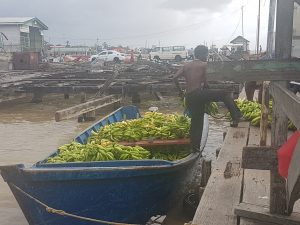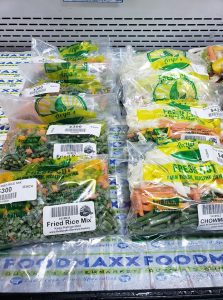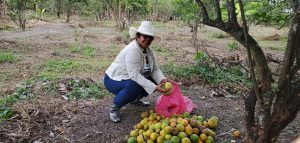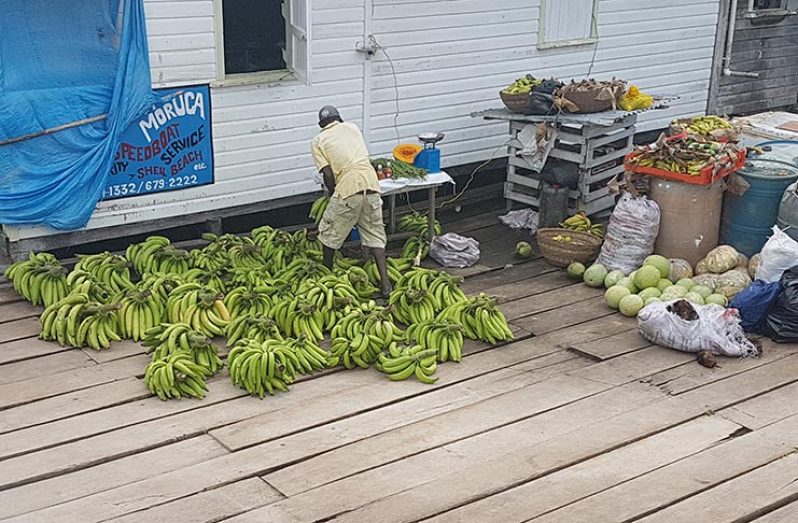By Ravena Gildharie
In recent weeks, Guyanese have been flocking the markets almost in panic for fresh fruits and vegetables, as the Coronavirus advances widespread necessity for healthy foods and intake of vitamin C. Some consumers have lamented the rise in prices and seemingly scarcity of certain produces especially citruses like lemons and oranges. There have been claims of lemons being retailed for as much as $600 each while oranges are reportedly being sold at $100 each. Occurrences like these have given rise to fears of national food security coming under threat. But for, a country like Guyana with an abundance of fertile lands and freshwater sources, what risks and what opportunities exist amidst this pandemic?

In the minds of people like Director of the National Agricultural and Research and Extension Institute (NAREI) Dr. Oudho Homenauth, Guyana, when compared to its neighbours in the Caribbean and even some across South America, is in a far better position to maintain food security, and to sustain the health and wellbeing of citizens as per normal. He is however not turning a blind eye to the fact that the Coronavirus is a global phenomenon with devastating impact on all activities including trade, businesses and therefore income and spending power of the population. Such effects can potentially stress not only the availability of food but access due to economic downturns and rise in prices. “There is need to ramp up food production, and this is something we have urging all long even before this crisis,” Dr. Homenauth outlined.
The United Nations’ Food and Agriculture Organisation (FAO) recently issued a call for world leaders to take measures to keep global food systems working well amidst the pandemic.
FAO director-general, Qu Dongyu, in an online address from Rome to the G20 Extraordinary Virtual Leaders’ Summit on COVID-19 days ago, stated: “the COVID-19 pandemic is affecting food systems and all dimensions of food security across the world…”
He posited that “no country is immune…we have to ensure that food value chains are not disrupted and continue to function well and promote the production and availability of diversified, safe and nutritious food for all.”
Boosting food production

So far in Guyana, and according to the NAREI Director, there are adequate supplies of fresh produces as well as meat stock including chicken, beef and pork. Aside from importation of hatching eggs for the production of chicken and table eggs, Guyana is self-sufficient in the production of beef and pork. Despite restrictions on air transport and closure of ports, Dr. Homenauth said the importation of hatching eggs and raw materials for feedstock to supply the livestock industry has not been affected. Air and river transport is still opened to cargo. Guyana relies on imports of materials such as soya to produce livestock feed.
Price increases for some local produce and food supplies, the Director observed may have been brought about by panic buying as he referred to instances of Guyanese rushing to stock up on large quantities of food. To this, he reminded: “we don’t need to buy a whole big bag of cherries or oranges to get vitamin C, all we need is a few per day.” He also noted that some of the highly sought-after produces are seasonal and may not have been in great abundance even before the pandemic. Additionally, Guyana has been experiencing a drought since last year, and while farmers have been facing troubles in accessing water for irrigation, their yields have not been as bountiful.
Notwithstanding this, the NAREI Director, who is one of Guyana’s leading specialist in the agricultural sector with decades of experience, confirmed that local food production is rising as statistics show a steady increase in cultivation and harvests, particularly over the last five years. This trend has been witnessed in both the export and local markets especially aided by the growth of the local processing industry. Though operating at the cottage level, there has been a surge in processing products such as peppers, green seasoning, jellies and jams among others.
Support and self-sufficiency
At the level of research development and extension services to support farmers, NAREI has been encouraging more cultivation, urging Guyanese to return to abandoned lands, providing technical assistance and ensuring the availability of planting materials.
For instance, a few years ago NAREI noticed local producers were moving away from the cultivation of lemons. The Institute began promoting lemon crop by encouraging farmers to plant the citrus, while NAREI sourced and propagated the seedling. Most of the lemon seeds were supplied from the Rupununi and North West District.
Even at this time, NAREI continues to provide extension services with technical officers conducting farm visits but under strict Coronavirus precautions. They are also utilising smartphones to maintain communication and provide help to farmers.
While this service is provided by the state, there are some producers seeking private agronomist to support farming activities. Mrs. Vilma Da Silva of the Lower Pomeroon is one such farmer who currently has approximately 37 acres of land under cultivation of various produce such as coconuts, plantains, bananas, citrus, fruits and vegetables.
“Right now I am not panicking. I am sitting here now, and can do so for the next year, getting food off my farm, eating healthy and continue living happily,” Da Silva stated, adding “we here in Guyana can’t be short of food and healthy food too.” Reacting to claims of price gouging for some fruits and vegetables, the farmer expressed her disappointment that sellers most in the City are abusing the situation.
“I don’t agree with exploitation. As a farmer, I don’t exploit people,” Da Silva stated. She noted that lemon is a seasonal produce, but she is able to sell year-round in small quantities. “Just last week I sold some lemons at $50 for one,” she told Pepperpot from her Pomeroon home. When there is a bumper crop, the farmer said she supplies as much as 36, 000 lemons.
A popular producer of bottled coconut water under the brand of Henvil Farms, Da Siva is now exploring the production of lemon-flavoured coconut water as a buyer in London had inquired and expressed interest in sourcing such supplies. These are opportunities which the farmer believes exist and can be explored even amidst a crisis.
Home delivery of fruits and vegetables
Locally, one agro-entrepreneur has seized the opportunity to provide Guyanese with home delivery of fresh fruits and vegetables. Arya’s Fresh Cut, popularly known for its supply of lettuces and other high end produces, is now offering home delivery to consumers in and around Georgetown and along the East Coast Demerara. On Fridays, the company delivers along the East Bank Demerara as far as Grove.

Entrepreneur Aditya Persaud related that the response has been encouraging since Arya’s Fresh Cuts has received over 100 orders in the first two days since the service was launched. On the company’s Facebook page, it publicizes what produces as in stock and ready for delivery. The producer has been delivering supplies such as lettuce, bora, pumpkin, celery, boulanger, cabbage, ginger and squash among others. According to Persaud, the produces are packaged and delivered in a reusable shopping bags, making it convenient for Guyanese at home as they currently adhere to the Coronavirus precautions.
He also assured that there is currently no shortage of produces and that there are adequate supplies to meet demands.




.png)









